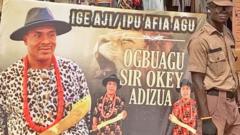In the heart of southeastern Nigeria lies Oguta, a town steeped in tradition and culture, characterized by the prestigious title of “Ogbuagu,” or “Leopard Slayer.” Achieving this title signifies not just a personal milestone but a culmination of a community’s historical practices, passed down through generations.
Recently, the community celebrated 60-year-old Ken Okoroafor, who, after long aspirations and years in the US, became the latest member inducted into the revered Igbuu Society, an all-male group with roots tracing back over four centuries. Slaying a leopard historically meant substantial bravery and served as a rite of passage for young men, but the practice has since evolved largely due to conservation efforts and societal shifts. Today, the society allows monetary contributions in place of the leopard, ensuring that the tradition can continue amid declining wildlife populations.
The transition to monetary donations traces back to as early as 1942, when circumstances surrounding a hunt prompted officials to accept cash instead of an animal. “From that time, you now had a choice,” explained Victor Aniche, secretary of the Igbuu Society, highlighting a crucial moment in the evolution of the ritual. The most recent example occurred in December when young men like Zubby Ndupu initiated their journey to becoming Ogbuagu, demonstrating how the tradition still bonds the local populations and the diaspora during festive seasons.
Ceremonial activities, including the symbolic reenactments and communal feasts, draw significant community participation. Participants dress in traditional garments, often adorned with ceremonial beads, affirming their status. However, underlying societal expectations remain concerning lineage and status. For instance, membership is exclusively reserved for men who have been married and uphold respectable reputations, leaving out the descendants of former slaves, known as “ohu.” Efforts to rectify this social exclusion are underway, voicing a desire to unify the community transcending ancestral grievances.
Critics of the Igbuu Society argue that the extravagant spending on ceremonies may divert funds that could benefit Oguta's development. The juxtaposition of cultural pride against modern-day challenges prompts conversations about sustainable community priorities. Yet, advocates like Aniche assert the society fosters development and encourages economic activity through communal gatherings, as funds circulate within the local economy during celebration periods.
Despite challenges, members of the Igbuu Society—including prominent figures like the late Supreme Court judge Chukwudifu Oputa—embody resilience and ongoing commitment to their heritage. As families gather for ceremonies, they not only celebrate individual achievements but reaffirm their connection to a legacy that stretches far beyond monetary pursuits.
In an era where wildlife conservation directly opposes certain traditional practices, the Oguta community exemplifies a dynamic balance between honoring historical significance while adapting to contemporary ecological realities. For individuals like Okoroafor and Adizua, becoming a Leopard Slayer is about more than the title— it's about reclaiming roots and fostering connections that extend across oceans and generations, reminding all of the importance in holding onto one's identity.
Recently, the community celebrated 60-year-old Ken Okoroafor, who, after long aspirations and years in the US, became the latest member inducted into the revered Igbuu Society, an all-male group with roots tracing back over four centuries. Slaying a leopard historically meant substantial bravery and served as a rite of passage for young men, but the practice has since evolved largely due to conservation efforts and societal shifts. Today, the society allows monetary contributions in place of the leopard, ensuring that the tradition can continue amid declining wildlife populations.
The transition to monetary donations traces back to as early as 1942, when circumstances surrounding a hunt prompted officials to accept cash instead of an animal. “From that time, you now had a choice,” explained Victor Aniche, secretary of the Igbuu Society, highlighting a crucial moment in the evolution of the ritual. The most recent example occurred in December when young men like Zubby Ndupu initiated their journey to becoming Ogbuagu, demonstrating how the tradition still bonds the local populations and the diaspora during festive seasons.
Ceremonial activities, including the symbolic reenactments and communal feasts, draw significant community participation. Participants dress in traditional garments, often adorned with ceremonial beads, affirming their status. However, underlying societal expectations remain concerning lineage and status. For instance, membership is exclusively reserved for men who have been married and uphold respectable reputations, leaving out the descendants of former slaves, known as “ohu.” Efforts to rectify this social exclusion are underway, voicing a desire to unify the community transcending ancestral grievances.
Critics of the Igbuu Society argue that the extravagant spending on ceremonies may divert funds that could benefit Oguta's development. The juxtaposition of cultural pride against modern-day challenges prompts conversations about sustainable community priorities. Yet, advocates like Aniche assert the society fosters development and encourages economic activity through communal gatherings, as funds circulate within the local economy during celebration periods.
Despite challenges, members of the Igbuu Society—including prominent figures like the late Supreme Court judge Chukwudifu Oputa—embody resilience and ongoing commitment to their heritage. As families gather for ceremonies, they not only celebrate individual achievements but reaffirm their connection to a legacy that stretches far beyond monetary pursuits.
In an era where wildlife conservation directly opposes certain traditional practices, the Oguta community exemplifies a dynamic balance between honoring historical significance while adapting to contemporary ecological realities. For individuals like Okoroafor and Adizua, becoming a Leopard Slayer is about more than the title— it's about reclaiming roots and fostering connections that extend across oceans and generations, reminding all of the importance in holding onto one's identity.





















